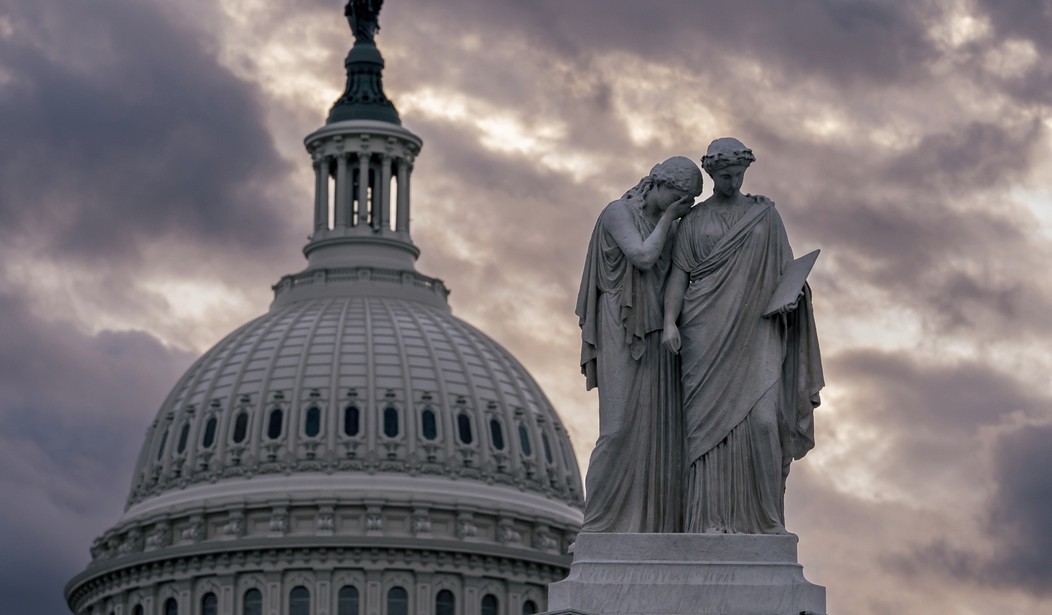The glacial pace of progress toward bringing Donald Trump's "Big, Beautiful Bill" up for a vote is finally beginning to bear fruit. On Friday, Republicans in the House released a framework to renew Trump's 2017 tax cuts and tweak the tax code to favor the middle class.
The bill contains "an increased child tax credit (CTC), a higher threshold for estate tax liability – what Republicans have referred to as the 'death tax,'" and an outline of a renewal of Trump's tax cuts, according to Fox News.
No word yet on the most contentious tax issue that will be in the bill. Deductions for state and local taxes (SALT) were capped at $10,000 in the 2017 bill. Many blue state Republicans want that deduction drastically increased. Right now, Speaker Mike Johnson is open to some adjustment to the SALT cap, but almost certainly, it won't be what the blue state members want. That may blow up the entire reconciliation bill, unless Johnson can find a way to finesse the dispute.
Another contentious issue is a Trump suggestion for a new millionaires’ tax bracket, which would impose a 2.6% tax increase on individuals making $2 million a year or more. Trump may not be wedded to the tax, and it's generated some opposition in the House among Republicans. But it would solve a lot of revenue problems facing the GOP, which is finding it extremely difficult to come up with enough budget cuts to make the bill palatable to budget hawks.
On the estate tax, which is levied on assets after person's death, it raises the exemption level to $15 million from the current level of roughly $13.9 million.
Republicans have long criticized the estate tax as a needless financial burden on grieving families, particularly hitting small family-owned businesses. Supporters of the federal estate tax point out that it affects a relatively small number of estates.
"Seven years ago, the Trump tax cuts sparked an economic boom and provided needed relief to working families. Pro-family, pro-worker tax provisions are the heart of President Trump’s economic agenda that puts working families ahead of Washington and will create jobs, grow wages and investment and help usher in a new golden age of prosperity," House Ways & Means Chairman Jason Smith, R-Mo., said in a statement on Friday night.
"Ways and Means Republicans have spent two years preparing for this moment, and we will deliver for the American people."
While the tax portion of the reconciliation bill may be coming together, the news isn't quite as hopeful elsewhere among Republicans in the House.
The Agriculture, Energy and Commerce, and Ways and Means committees are targeting the release of their portions of the bill late next week. That might be very optmistic. There are still several issues that the factionalized House is far apart on, and that threaten to blow up the entire reconciliation process.
I've written about the struggle over having to find $880 billion in Medicaid cuts over the next 10 years. That's one issue. Another critical issue is green energy credits. Once again, blue state Republicans are fighting for at least some of the green energy credits, while a majority of the caucus wants them all gone.
Seeking to put a marker down for where Republicans across the conference might be willing to compromise, Garbarino and Rep. Jen Kiggans (R-Va.) have introduced the “Certainty for Our Energy Future Act.” It would phase out solar and wind incentives, disqualify companies tied to foreign adversaries and preserve the ability of businesses to buy and sell certain clean energy credits — a practice known as “transferability.”
Republican Reps. Dan Newhouse of Washington, David Valadao of California and Mark Amodei of Nevada have also signed on to the legislation.
“The goal was to find a place that people could live with,” said a Kiggans aide granted anonymity to speak about internal deliberations. The aide also called it a “starting point” and a “best-case scenario” as this group of Republicans and nearly two dozen others go up against hard-liners who want a full repeal of the suite of clean energy tax credits codified by the Inflation Reduction Act, which President Donald Trump likes to call the “Green New Scam.”
With a margin for error of only three votes, it seems obvious that every House Republican is going to have to swallow hard and forgo seeing his or her pet issues in the final bill.
Trump and Johnson have their work cut out for them.










